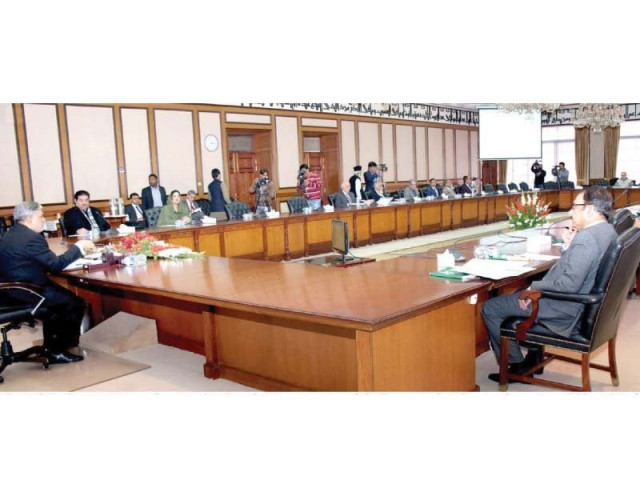ECC meeting: Govt decides to borrow Rs30b to pay off power sector liabilities
Funds will be parked in state-owned Power Holding Limited, will take amount of loans to Rs365 billion

The ECC approved the summary to pay off liabilities of Pakistan State Oil and Independent Power Producers. PHOTO: INP
With the decision to borrow Rs30 billion afresh, the amount of loans obtained from banks to retire circular debt and park in the government-owned Power Holding Limited would increase to a whopping Rs365 billion. This is in addition to Rs370 billion circular debt that is affecting the balance sheets of the energy sector’s public and private companies.
The Economic Coordination Committee (ECC) of the Cabinet approved a summary to borrow the money on the books of the holding company.
These borrowings would eventually become liabilities of power distribution companies that are already running into losses.
The ECC deferred a summary moved to waive off withholding tax on the income of China Electric Power Equipment and Technology Company Limited (CET) that is setting up the Lahore-Matiari power transmission line at a cost of $1.78 billion. The Federal Board of Revenue (FBR) opposed the summary over growing numbers of tax exemptions granted to energy projects being set up under the China-Pakistan Economic Corridor (CPEC).
Borrowings
The ECC approved the summary to borrow Rs30 billion, said the finance ministry. The money would be obtained to pay off the liabilities of Pakistan State Oil and Independent Power Producers, said the officials of the Ministry of Water and Power. The furnace oil supplies to the power plants were at risk due to increase in receivables of the PSO that grew to Rs277 billion.
The Ministry of Finance would service the debt while the principal amount would become liabilities of the power distribution companies. However, there is a likelihood that the government would recover both principal and interest from electricity consumers through tariffs, as is the case with the debt parked in the holding company.
The government has failed to fully address the chronic issues facing the power sector and resultantly, the circular debt keeps growing every passing day. Although the ratio of recovery of bills and reduction in line losses has improved relative to three years ago, it is still below the desired targets.
The power distribution companies were in a poor financial health due to bad governance and inefficiency. Last year, Faisalabad, Islamabad and Multan power distribution companies reported Rs31 billion losses. The Sukkur, Hyderabad, Peshawar, Quetta and Tribal power distribution were already running into losses.
Withholding tax exemption
The ECC deferred a proposal of Ministry of Water and Power on granting withholding tax exemption on dividend income of Matiari to Lahore power transmission line. The summary has been deferred for inter-ministerial discussion and re-submission to the ECC thereafter, said the finance ministry.
The ministry sought exemption from 7.5% withholding tax on income of Matiari-Lahore power transmission project. The FBR opposed the summary on the grounds that the exemptions would adversely hit revenues.
A special meeting for CPEC energy projects, held in December in Beijing, decided that preferential policies covering CPEC energy projects will also be applicable to the Matiari transmission project.
Rough estimates suggest so far Rs150 billion worth tax exemptions have been given to CPEC-related projects, according to sources in the FBR. These include Rs80 billion exemptions to four mass transit projects.
Tax-to-GDP ratio will further go down once CPEC projects become fully operational, said the FBR sources.
Prominent Economist Dr Kaiser Bengali has recently raised the question about the quantum of tax exemptions to CPEC-related imports and its impacts on state revenues and the manufacturing sector.
It has waived off dividend tax on the income of the Chinese financial institutions.
The transmission line is being constructed as part of the CPEC. The contract is worth over $1.76 billion, according to CET.
Instead of sanctioning Rs1.1 billion subsidy for maintaining prices of essential items at utility stores, the ECC ordered a special audit of the sale-purchase prices. “The chair with consensus of the house deferred the matter of release of funds and directed for a special audit of the sale-purchase prices of certain items, within 15 days to determine the need for release of the amount of subsidy,” said the Ministry of Finance.
Published in The Express Tribune, February 14th, 2017.
Like Business on Facebook, follow @TribuneBiz on Twitter to stay informed and join in the conversation.



















COMMENTS
Comments are moderated and generally will be posted if they are on-topic and not abusive.
For more information, please see our Comments FAQ